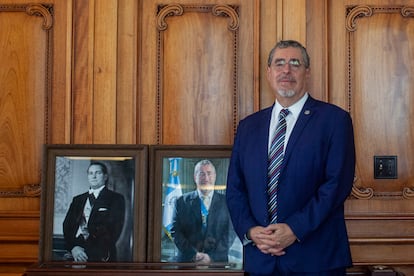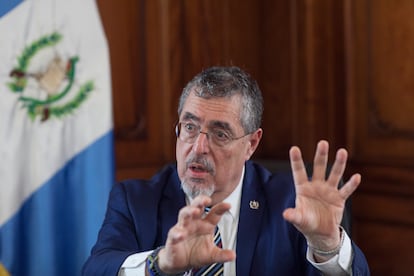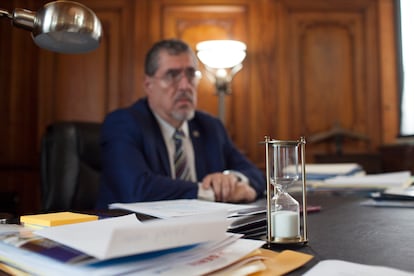Bernardo Arévalo: ‘We have reaffirmed that Guatemala can have a government that doesn’t bend the knee to corruption’
In an interview with EL PAÍS, the Guatemalan president talks about his commitment to transparency in a country plagued by impunity and explains the reasons that led him to receive 135 political prisoners from Nicaragua


Less than a year ago, it seemed possible that Bernardo Arévalo would not occupy the chair he now sits in at the National Palace, in the heart of the capital of Guatemala, despite having won the elections. The politician and his group, the Seed Movement, fought against the dark forces in Guatamala that keep corruption entrenched to protect and favor powerful economic sectors, corrupt politicians and impartial judges. The goal for Arévalo — who campaigned on a platform of honesty and won over voters fed up with impunity — was to enforce the will of the people, who had elected him president.
Arévalo was up against a corrupt judicial system and an attorney general, Consuelo Porras, who not only tried to torpedo his victory and stop him from being sworn in, but has also since become the president’s main opposition. Arévalo, 65, speaks to EL PAÍS in the office from which he governs and reviews the achievements of his administration, which completed its first 100 days in May. It has been an obstacle course for the charismatic politician, who scored a diplomatic victory after receiving 135 political prisoners from the Nicaraguan regime led by Daniel Ortega. He talks to EL PAÍS about the reasons that led him to make that decision and his anti-corruption crusade.

Question. What led you to agree to accept political prisoners released by the Nicaraguan regime?
Answer. It is a decision consistent with our own vision of the need to support and protect democracy anywhere in the world. The fact that democracy is not everywhere affects us all, and the spread of democracy is an advantage for everyone. With Nicaragua, there is a fundamental commitment to the people who are fighting for democracy, so when the U.S. government asked us if we would be willing to receive this contingent in the event that their release was achieved, we immediately said yes, without thinking twice.
Q. Do you expect anything in return from the United States for this gesture?
A. Absolutely nothing.
Q. What do you think of President Ortega’s government?
A. It is a government that is violating democratic principles, that is persecuting people who demand the right to have their opinions heard and made valid at the polls, which is what we have defended in our own country. It is the same position that leads us to reject the alleged electoral result announced by the National Electoral Council of Venezuela, because we understand that it is a violation of democratic principles.
Q. I asked you what you expect from the United States because you have come to the presidency with an ambitious political project, but face a difficult situation within the country. Do you expect U.S. support to promote your program?
A. Our experience shows that international support is essential for countries fighting for democracy in the context of situations that, in one way or another, imply an authoritarian reconfiguration. We have experienced this directly: we had international observers who were fundamental during the elections, the Organization of American States played an extremely important role, as did the European Union, and the support we had from the United States. It was a fundamental framework for Guatemalans who were fighting to assert our political rights to be heard and respected as they are enshrined in the Constitution.
Q. You have a very complicated internal political situation. You only have 23 deputies in Congress to support your agenda, which includes fighting corruption. What progress has there been on this issue?
A. From the executive, we are fighting against corruption in a very clear manner by making the complaints that correspond to us and taking them to the Public Prosecutor’s Office, which will have to account for what it does with all this evidence of corruption cases that we are placing before them. We are not giving up in these efforts.

Q. One of the most controversial branches of government in the country is the judiciary and the public prosecutor’s offices. The attorney general, Consuelo Porras, is openly opposed to your government, and even refused to meet with you. And you said you wanted to remove her. What is your relationship with the attorney general now that you are president?
A. We have submitted an initiative to Congress for legal reform that would simply make the attorney general accountable, because the reform made in 2016 creates a position, which is the only position within the institutional structure of the country, who does not have to be accountable to anyone, which is unconstitutional, because it is structural impunity. Our position regarding the attorney general is clear: before taking office, we had asked for her resignation and when we started, we did everything within the legal means to achieve change, but the Attorney General’s Office continues in its effort to criminalize the Semilla Movement, this government. I personally have seven cases against me, and we have a colleague who is in prison for spurious reasons. It’s continuous harassment. The public prosecution continues in its campaign to try to avoid what is inevitable and that is that the country’s institutional structure is finally freed from the corrupt.
Q. In Guatemala, the term “corrupt pact” is used to describe an alliance between political, judicial and business sectors that weighs down the system. What actions have you taken to break this pact? Can this pact be broken in Guatemala?
A. The corrupt pact is an expression that indicates the convergence of interests by different actors. There is no formal or real pact, nor are they all formally united around a common purpose, but rather they converge because it suits them. There are corrupt politicians, previous administrations, businessmen who have participated in these types of issues, judicial officials, prosecutors, judges. These people continue to operate within this system, but look at the process of electing courts that has been taking place, where what we have seen is that this political-criminal network was not able to take control. There is a process of losing control that we hope will be confirmed in the election of courts that will take place in the month of October in Congress.
Q. However, the power that this system has maintained remains in force. For example journalist José Rubén Zamora was unjustly imprisoned for denouncing corruption.
A. The case of Zamora is an example of the criminalization that is carried out by the justice system against people who confront structural corruption and impunity. His imprisonment was, on the one hand, to punish him for this confrontation and, on the other, as a warning to those who are still fighting in this regard. Of course they have power, they have the power to put a government official, such as the director of the Institute for Victims, in provisional arrest for spurious and absurd reasons; they have the power to make a case against the Semilla Movement, denying us the right to defense at every turn. Of course they have power, but it is not the only power and we are clearly fighting to save institutions from this suffocating embrace and we have popular support, which is increasingly clear, to achieve this.
Q. Have you, as president, taken any measures in the case of journalist Zamora?
A. Yes, all the measures that correspond to us from the executive branch. We took office on January 14 and on January 15, the Minister of the Interior, Francisco Jiménez, went to the prison where José Rubén Zamora is being held to correct the conditions in which he was being held, which were practically akin to torture. We are giving him the best possible conditions within the legal framework, because we cannot go beyond what the law allows us to do. We even discussed with him the possibility of transferring him to another prison.
Q. Guatemala suffers from appalling levels of poverty, particularly among Indigenous populations. What are your plans to alleviate the suffering of these people?
A. Sixty percent of the population of Guatemala lives in poverty. The majority is Indigenous and the majority lives in highland states that have been sidelined from public investment. We have a development strategy that follows a logic of public investment in rural roads and secondary highways. We are going to invest in irrigation, in electrification, where there is no investment in public schools, in health centers. The intention is to follow a development program that manages to support a population that today largely lives on subsistence agriculture to allow the people to become small agricultural producers. We are not going to be able to solve the problem of poverty in the country because 400 years of marginalization, racism and neglect are not going to be solved overnight, but we are going to lay the foundations to develop that area, which is home to the poorest people in the country.

Q. You took office in January, what would you say are your main achievements so far?
A. First of all, we have reaffirmed that in Guatemala there can be a government that does not bend the knee to corruption and to these groups that seemed almost inevitable in the country’s political future. It is difficult work, because they are still entrenched in the justice system and have the capacity to attack and be hostile, but we are moving forward by making sure the public sector works. We are generating those elements that will begin to make it evident to the population that a different future exists, when one no longer votes for corrupt politicians.
Q. Are you afraid of failing? Are you afraid of losing people’s support?
A. No. We are committed to responding to the trust that people have in our movement, that they have in our government, and our task is to continue to concretely demonstrate to the people why electing honest politicians is the best bet for the future of the country.
Q. What Guatemala do you hope to leave behind when your term ends?
A. A Guatemala convinced that it has a future without the corrupt, that working together will achieve progress in development. A Guatemala where the principles of respect for human rights and the validity of democratic institutions are more deeply rooted in the population.
Sign up for our weekly newsletter to get more English-language news coverage from EL PAÍS USA Edition
Tu suscripción se está usando en otro dispositivo
¿Quieres añadir otro usuario a tu suscripción?
Si continúas leyendo en este dispositivo, no se podrá leer en el otro.
FlechaTu suscripción se está usando en otro dispositivo y solo puedes acceder a EL PAÍS desde un dispositivo a la vez.
Si quieres compartir tu cuenta, cambia tu suscripción a la modalidad Premium, así podrás añadir otro usuario. Cada uno accederá con su propia cuenta de email, lo que os permitirá personalizar vuestra experiencia en EL PAÍS.
¿Tienes una suscripción de empresa? Accede aquí para contratar más cuentas.
En el caso de no saber quién está usando tu cuenta, te recomendamos cambiar tu contraseña aquí.
Si decides continuar compartiendo tu cuenta, este mensaje se mostrará en tu dispositivo y en el de la otra persona que está usando tu cuenta de forma indefinida, afectando a tu experiencia de lectura. Puedes consultar aquí los términos y condiciones de la suscripción digital.








































